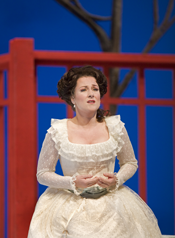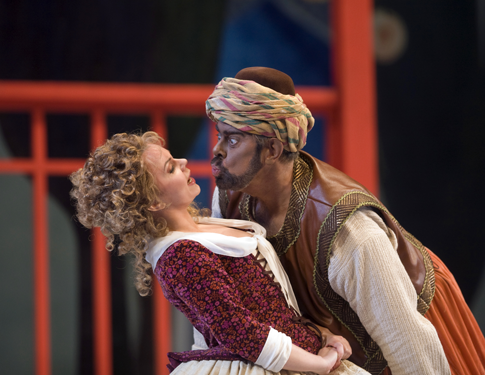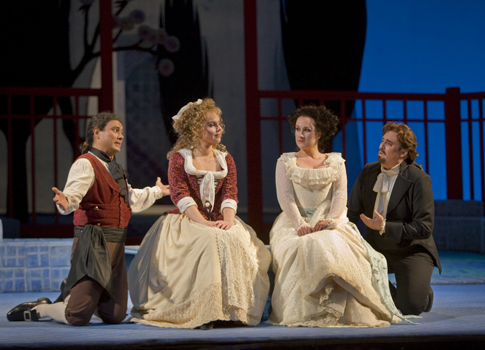
07 May 2008
Die Entführung aus dem Serail
Die Entführung aus dem Serail is too light to be a grand opera, but it makes rather grander demands of its singers than operetta could possibly bear.
English National Opera’s production of Harrison Birtwistle’s ‘Punch and Judy’ is the company’s second collaboration with the Young Vic Theatre — following the premiere of Neuwirth’s ‘Lost Highway’ a few weeks earlier — and remarkably, also the second London production of this early Birtwistle work within a month, the previous one having been at the Linbury Studio Theatre, a collaboration between Music Theatre Wales and the Royal Opera.
Over the years, one tried and true method of packing audiences in to the concerts of Robert Bass’s Collegiate Chorale has been to present concert opera with impressive soloists.
Martha Graham used to say, “In order for there to be dance, there must be something that needs to be danced.”
When the Met presented La Fille du Régiment for Lily Pons during World War II, she sought permission to wave the Cross of Lorraine, symbol of Charles de Gaulle’s Free French, during the Salut à la France in Act II.
Why does one so seldom encounter Dvořák’s Rusalka on stage?
Satyagraha is an odd duck to encounter if you are seeking a traditional opera-going experience or anything like it.
Victor DeRenzi is a man of convictions — and of courage. Given his commitment to tradition, you might call DeRenzi, artistic director of Sarasota Opera since 1982, conservative.
With what might (if one were risking facetiousness) be termed a “false-set” of four countertenors in the cast, this was always going to be an intriguing production of Handel’s Giulio Cesare for aficionados of a voice type which has revolutionised the perception (and popularity) of baroque opera over the past 15 years.
Harrison Birtwistle’s new full-scale opera, commissioned by the Royal Opera House, Covent Garden, is a study of isolation and imprisonment.
It was one of Queler’s good nights.
It is, you might say, the little opera that can. True, if it’s size of the budget, the price of tickets and the number of seats that concerns you, the Komische Oper is clearly the third of Berlin’s opera houses.
What to make of "Lucrezia Borgia"? I have always felt that, some lovely arias notwithstanding, this Donizetti work never really gets going until the slam-bang soprano-baritone duet in Act II.
That Fed Dostoevsky – sure plays a mean pinball!
Plainly put, Frankfurt Opera’s “The Rape of Lucretia” could be offered as a textbook example of just how great a performance can be when everything goes right.
BERLIN — Which car-rental agency was it that was once No. 2 and “trying harder?”
In a climate in which bel canto opera seems to be enjoying a steady and welcome revival, ETO opened their current season with a welcome production of Donizetti's historically dubious account of the latter days of Anne Boleyn. The company's...
The most interesting opera on ETO's Spring 2008 tour was Carlisle Floyd's 1950s tale of religious hypocrisy in the rural Deep South, based on the Apocryphal tale of Susannah and the Elders.
The last of the three operas on ETO's Spring 2008 tour was sung in English, and updated to a Spain of the mid-twentieth century under Franco.
Opera companies often tout new productions as a major attraction of their seasons.
At the curtain call for the first night of WNO’s new production of the infrequently performed Khovanshchina director David Pountney wore a simple Russian shirt.

Die Entführung aus dem Serail is too light to be a grand opera, but it makes rather grander demands of its singers than operetta could possibly bear.
What, then, is it?
Mozart was eager to make a splash in the music scene of Vienna, to which he had just moved, and in the opera scene of Central Europe under a discriminating and forward-thinking patron, Joseph II, and – not a little – as a figure in the Enlightenment, the shining of a new light of universal brotherhood and citizenship in which glow humanity would emerge from the prejudices and bigotries of old. With his delicious Seraglio, Mozart failed and he triumphed: during his brief lifetime, it was the most popular of his operas, a hit throughout the German-speaking world.
Joseph II, himself newly liberated from the restraints of his mother and “co-regent,” Maria Theresa, was seeking new ways to give unity to his disparate realms (from Transylvania to Flanders to Milan). Nationalism seemed a likely card to play and in that cause he created a German national theater in Vienna to which the most talented actors and playwrights were invited. That success inspired him to attempt a German opera company, replacing all the Italian stuff, perhaps building on the ballad-operas that an English import, The Beggars’ Opera, had spun off all across the land. This new plan was not a success – none of the contributions to it were very inspired except Seraglio, the last, for which both Mozart and Joseph had the highest hopes.
Here, as so often, Mozart got carried away: He paid his audiences the compliment of assuming they were intelligent enough to understand what he was up to. Upon a traditional escape-plot, with exotic music inspired by Janissary marching bands, he devised a fable of true love tested – and rewarded, thanks to an enlightened pasha who, alas, never gets to sing anything. But for the resourceful Belmonte and stalwart Konstanze, whose high birth must be demonstrated so as not to let the message seem too revolutionary, Mozart composed music as difficult to sing as it is wonderful to hear. Indeed, only a most Italian-trained singer could possibly get through Konstanze’s music in any decent shape – she may well be the single most difficult role in the dramatic coloratura repertory.
This was not at all the Germanic simplicity Joseph was looking for, and he was a little startled: “Too beautiful for our ears, my dear Mozart, and a monstrous lot of notes,” he is said to have commented. Those inclined to hoot at the monarch for his folly should try to sing either lead role before they do so, or listen to the hash most top-ranked divas make of Konstanze’s arias, whose demands Mozart enhanced to display the phenomenal agility of Salieri’s mistress, Caterina Cavalieri, who created the part. A soprano once told me, “They say ‘Martern aller Arten’ is the toughest thing to sing in the entire repertory, and it’s true – because ‘Ach ich liebte’ cannot be sung!”
 Aleksandra Kurzak as Blondchen and Kristinn Sigmundsson as Osmin in Mozart's "Die Entführung aus dem Serail."
Aleksandra Kurzak as Blondchen and Kristinn Sigmundsson as Osmin in Mozart's "Die Entführung aus dem Serail."
Diana Damrau made rather a splash last fall singing Pamina and the Queen of the Night in alternate performances of The Magic Flute – but Konstanze is a tougher part than either of those, and Damrau’s attractive but not abnormally agile soprano was simply not up to it: colorless trills, tuneless runs, desperate and ill-supported leaps at the pitch that one can’t really justify by reference to her desperate situation in the plot. There were some lovely triplet figures in “Ach ich liebte” and she got through “Martern aller Arten” honorably but not pleasurably. She was less “constant” than one had hoped.
Alexandra Kurzak, who has also made a success of the Queen of the Night, had a far easier time with the far easier role of Blondchen.
Matthew Polenzani has sung Mozart roles – including Belmonte at the City Opera a few years ago, but even more so Ferrando in the Met’s last run of Così fan tutte – with a grace, an elegance, an ease of phrase from top to bottom that place him among the finest Mozart tenors not only of this generation but previous ones – one thought of Wunderlich, Valetti and Gedda. But this time around his Belmonte was rough going – he hit the notes, but the sound was less than delectable, a gravelly quality creeping in. Far more pleasing was the tenor of Steve Davislim, a debutant, as Pedrillo; his preposterous “Moorish” serenade in Act III could have gone on for three or four more verses without wearying the ear. All four singers – despite a little shrillness from Miss Kurzak – reached their peak during the splendid lover’s quarrel quartet that ends Act II, the first “conversational” concertato in opera, from which so much was to develop.
Kritinn Sigmundsson, a witty actor with a fine, house-filling, orotund bass, was almost all one could wish for in an Osmin – the one character untouched by the “enlightened” multicultural benevolence, and therefore the one who makes that achievement seem as impressive as it is. Sigmundsson, alas, lacks the low F’s and E’s that a great Osmin requires – that Kurt Moll and Matti Salminen had – but gave such pleasure it was easy to overlook this flaw. Matthias von Stegmann seemed a bit effete in the non-singing role of the sentimental Pasha – he did wave those long-stemmed roses about a bit much. (Like many other admirers of this opera, I’ve always regretted that the Pasha does not sing – couldn’t we transfer an aria or two from Mozart’s unfinished other Turkish singspiel, Zaide? And maybe drop one of Belmonte’s four repetitive arias to fit it in?)
 Matthew Polenzani as Belmonte, Steve Davislim as Pedrillo, Aleksandra Kurzac as Blondchen and Diana Damrau as Konstanze in Mozart's "Die Entführung aus dem Serail."
Matthew Polenzani as Belmonte, Steve Davislim as Pedrillo, Aleksandra Kurzac as Blondchen and Diana Damrau as Konstanze in Mozart's "Die Entführung aus dem Serail."
The old John Dexter production is restaged at each revival; there is nowadays more beefcake on display (Dexter would have enjoyed that), but in general Max Charruyer’s revisions are sensible, coherent – and funny. David Robertson made rather scrappy work of the exquisite overture, and the flutes were rackety during “Martern aller Arten,” but this lovely little masterpiece’s many parts fell by and large neatly into place.
John Yohalem